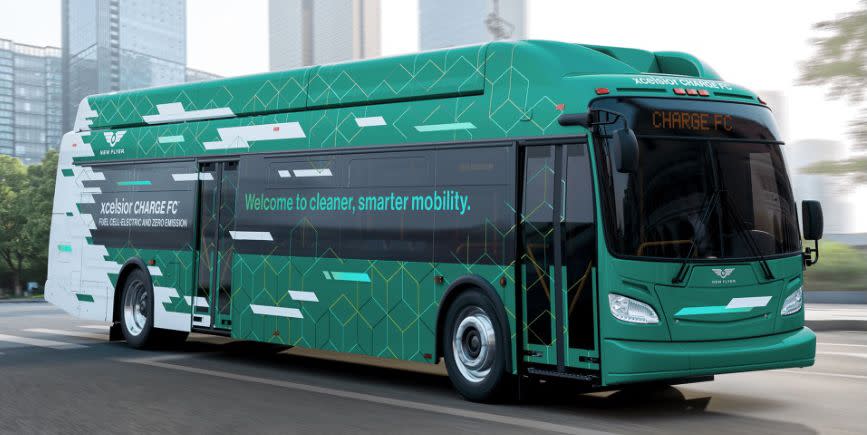Hydrogen Fuel-Cell Buses Are Headed to This East Coast City

Southeastern Pennsylvania Transportation Authority (SEPTA) plans to purchase 10 fuel-cell electric buses (FCEBs) from New Flyer in 2024, as part of a trial of hydrogen tech in bus fleets.
The New Flyer Xcelsior Charge FC offers a range of over 370 miles, and a relatively quick refueling time, in contrast to battery-electric bus models.
The 10 buses and related equipment will cost SEPTA just over $17 million, as the transportation industry continues to experiment with zero-emission tech.
While most of the focus on hydrogen fuel-cell tech over the past decade has been on passenger cars, with automakers like Toyota even offering a hydrogen model to California residents, the focus is now shifting to trucks and buses, as fleets seek to implement zero-emissions targets.
Southeastern Pennsylvania Transportation Authority (SEPTA) revealed this week it will purchase 10 fuel-cell electric buses (FCEBs) as part of an evaluation effort, as it proceeds to its zero-emission fleet goals. The 40-foot buses themselves will be produced by New Flyer of America, and are expected to be delivered by next summer.
New Flyer's Xcelsior Charge FC 40-foot model features 40 to 52 seats, and a range of over 370 miles along with a fueling time ranging from 6 to 20 minutes.
"Hydrogen buses offer similar range and performance as diesel-hybrid buses with quieter operation, lower maintenance costs, and less than half the lifecycle greenhouse gas emissions," SEPTA noted in a statement.
This 10-bus evaluation program won't be cheap, however. SEPTA indicated that it will have to spend $17,051,216.78 on the tools, equipment, training, fueling infrastructure, and the buses themselves as a part of this effort. The transport organization plans to launch the buses in its Midvale District in Philadelphia, which is currently its largest bus depot.
"As part of our strategic plan, SEPTA Forward, we are embracing new technologies that will help us reduce emissions for the communities that we serve," said SEPTA General Manager and CEO Leslie S. Richards.
As with passenger cars, the main competition to the concept of hydrogen fuel-cell buses are diesel-electric hybrid and battery-electric buses (not counting trolleybuses), with no shortage of models now offered in Europe and North America, among other regions. But as usual with this technology, it requires significant expenditures on fueling infrastructure rather than the buses themselves. And so do battery-electric buses.
At the moment the trajectory of hydrogen fuel-cell powertrains in transport appears to favor heavy trucks that serve sea ports and carry cargo to manufacturing centers and warehouses inland. This allows fleets to operate hydrogen infrastructure in ports and along highway corridors. The same principle can be applied to bus depots, the thinking goes, with quick refueling being one of the advantages of using hydrogen.
Is hydrogen a worthwhile technology to pursue in buses, or should transportation companies just focus on battery-electric buses? Let us know in the comments below.

 Yahoo Autos
Yahoo Autos 